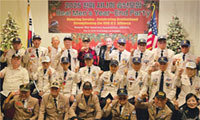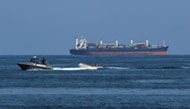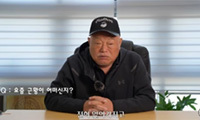
A family of Swiss engineers stands accused of helping smuggle nuclear technology. Centrifuge casings from Libya, under guard in Tennessee.
By WILLIAM J. BROAD and DAVID E. SANGERThe president of Switzerland stepped to a podium in Bern last May and read a statement. The government, he acknowledged, had destroyed a trove of computer files and other material documenting the business dealings of a family of Swiss engineers suspected of helping smuggle nuclear technology to Libya and Iran.
The files were of interest not only to Swiss prosecutors but to international atomic inspectors looking into the activities of Abdul Qadeer Khan, the Pakistani bomb pioneer-turned-nuclear black marketeer. The Swiss engineers, Friedrich Tinner and his two sons, were accused of having deep ties with Dr. Khan, acting as middlemen in his dealings with rogue nations seeking nuclear equipment and expertise.
The Swiss president, Pascal Couchepin, asserted that the files - which included an array of plans for nuclear arms and technologies, among them a highly sophisticated Pakistani bomb design - had been destroyed so that they would never fall into terrorist hands.
The real story is a far more intriguing tale of spies, moles and the compromises that governments make in the name of national security.
The United States had urged that the files be destroyed, according to interviews with five current and former Bush administration officials. The purpose, the officials said, was less to thwart terrorists than to hide evidence of a clandestine relationship between the Tinners and the C.I.A. Over four years, several of these officials said, operatives of the C.I.A. paid the Tinners as much as $10 million. In return, the Tinners delivered secret information that helped end Libya’s bomb program, reveal Iran’s atomic labors and, ultimately, undo Dr. Khan’s nuclear black market.
The relationship with the Tinners “was very significant,” said Gary S. Samore, who ran the National Security Council’s nonproliferation office when the operation began.
Destruction of the files, C.I.A. officials suspected, would undermine the case and could set their informants free. “We were very happy they were destroyed,” a senior intelligence official in Washington said .
European analysts studying Dr. Khan’s network worry that by destroying the files , the Swiss may have obscured the investigative trail.
The Swiss judge in charge of the Tinner case, Andreas Muller, said he had no warning of the planned destruction and is now trying to determine what, if anything, remains of the case against the Tinners.
As recounted in books and articles and reports by nuclear experts, Mr. Tinner worked with Dr. Khan for three decades, beginning in the mid-1970s. His expertise in vacuum technology aided Dr. Khan’s development of atomic centrifuges, which produced fuel for Pakistan’s nuclear arsenal, now estimated at 50 to 100 warheads.
Mr. Tinner’s involvement with Dr. Khan deepened in the late 1990s, when, joined by his sons, Urs and Marco, he helped supply centrifuges for Libya’s secret bomb program.
In 2000, American officials said, Urs Tinner was recruited by the C.I.A. Eventually, Urs Tinner persuaded his father and younger brother to join him as spies, and they began double lives, supplying Dr. Khan with precision manufacturing gear and helping run a centrifuge plant in Malaysia while cooperating with the United States.
Under growing pressure, Dr. Khan confessed. His clients turned out to include not only Libya but Iran and North Korea, and his collaborators turned out to be legion.
After the Tinners were arrested, Swiss and other European authorities began to scrutinize their confiscated files and to conduct wide inquiries. In 2005, Swiss authorities asked the United States for help in the Tinner case for more than a year. Washington ignored them.
“Its lack of assistance needlessly complicates this important investigation,” David Albright, of the Institute for Science and International Security, a private group in Washington, told Congress in May 2006.
In late July 2007, according to Swiss federal statements, the justice minister, Christoph Blocher, flew to Washington for talks with Mike McConnell, the director of national intelligence; Alberto R. Gonzales, then the attorney general; and Robert S. Mueller III, the F.B.I. director.
American officials discussed a range of possible outcomes with the Swiss and expressed their clear preferences. The best result, they said, would be turning over the family’s materials to the United States. Acceptable would be destroying them. Worst, according to the former administration official, would have been making them public in a criminal trial, where defense lawyers would have probably exposed as much American involvement as possible in hopes of absolving their clients.
Last March, Mr. Muller became the examining magistrate in the Tinner case, charged with assessing if a trial was warranted. Soon after, he was quoted as saying the evidence contained “obvious holes.” Then, on May 23, the Swiss president, Mr. Couchepin, revealed that Switzerland had begun a series of extraordinary actions just days after Mr. Blocher, the justice minister, returned from Washington.
Swiss citizens are prohibited from aiding foreign spies. But in his statement, the president said that in late August 2007, the government canceled a criminal case against the Tinners for suspicions of aiding a foreign government. Though unmentioned, the C.I.A. seemed to be part of the story.
On November 14, his statement continued, the government decided to destroy “the comprehensive holding of the electronic files and documents” seized from the Tinners. The most dangerous items, the president said, included “detailed construction plans for nuclear weapons, for gas ultracentrifuges for the enrichment of weapons-grade uranium, as well as for guided missile delivery systems.” International atomic inspectors, he added, supervised the destruction.
Mr. Couchepin said keeping the documents “was incompatible with Switzerland’s obligations” under the Nuclear Nonproliferation Treaty and added, “Under all circumstances, this information was not to reach the hands of a terrorist organization or an unauthorized state.”
The statement provoked a political furor. Some politicians and columnists accused Switzerland of surrendering to Washington’s agenda and violating Swiss neutrality. Among the strongest critics was Dick Marty, a prominent Swiss senator. “We could have respected the treaty by avoiding their publication and putting them under lock and key,” he was quoted as saying on Swissinfo, the Web site of the Swiss Broadcasting Corporation. Destroying them, he added, “could lead to the collapse of the legal case.”
Many European officials dismissed the government’s arguments about terrorists and rogue states .
“If they had kept the material in federal possession for years, why not keep holding it-” asked Victor Mauer, a senior official at the Center for Security Studies of the Swiss Federal Institute of Technology. “Their explanation is not convincing.”
스마터리빙
more [ 건강]
[ 건강]이제 혈관 건강도 챙기자!
[현대해운]우리 눈에 보이지 않기 때문에 혈관 건강을 챙기는 것은 결코 쉽지 않은데요. 여러분은 혈관 건강을 유지하기 위해 어떤 노력을 하시나요?
 [ 건강]
[ 건강]내 몸이 건강해지는 과일궁합
 [ 라이프]
[ 라이프]벌레야 물럿거라! 천연 해충제 만들기
 [ 건강]
[ 건강]혈압 낮추는데 좋은 식품
[현대해운]혈관 건강은 주로 노화가 진행되면서 지켜야 할 문제라고 인식되어 왔습니다. 최근 생활 패턴과 식생활의 변화로 혈관의 노화 진행이 빨라지고
사람·사람들
more
‘러브인뮤직’ 2025 성탄 음악회 성료
러브인뮤직은 지난 20일 LA 동양선교교회(담임 김지훈 목사)에서 가진 2025 성탄 작은 음악회를 끝으로 각 지역 봉사처별 올해 활동을 마무…

한인 향군 단체들 ‘진짜사나이’ 송년 행사
6·25 참전유공자회(회장 이재학)와 육군협회(회장 최만규)가 공동 주최한 2025 ‘진짜사나이’ 송년모임이 지난 19일 LA 용궁식당에서 한…
“취미생활로 다진 친목… 선후배들과 만든 모교사랑…
사진러브한인 사진 동호회 사진러브(회장 크리스 고)는 13일 용수산에서 송년모임을 갖고 한 해를 마무리하는 뜻깊은 시간을 가졌다. 이날 모임에…
[홀인원] 이상원 박사
일반외과 전문의 이상원(왼쪽) 박사가 지난 9일 뉴포트비치 소재 골프장 9번 홀(152야드)에서 레스큐 클럽으로 친 샷이 그대로 홀에 빨려 들…
[송년행사 게시판] 재미시인협회
재미시인협회(회장 지성심)는 오는 20일 오후 4시 가든스윗호텔에서 한 해를 마무리하며 동인지 ‘외지’ 제35집 출판 기념회와 ‘제23회 재미…
많이 본 기사
- 연말 ‘로드레이지’ 비극… 한인 총격 피살
- 밴스에 줄선 찰리 커크의 ‘마가 제국’…차기 대선후보 띄우기
- ICE 홈디포 급습단속에 한인 체포 1
- “올해 미국서 AI 사유로 일자리 5… 1
- 특검, ‘김건희 집사’ 김예성에 징역 8년 구형… “죄질 불량”
- ‘통일교 특검’ 출범 초읽기…與, 지지층 여론·野 압박에 수용
- ‘거액 탈세·통관 사기’ 한인 통관브로커 중형
- 한국계 NASA 우주비행사 조니 김 … 1
- 성탄 연휴 폭우 ‘비상’ 주중 최대 6인치 온다
- ‘SNS 검증’에 비자심사 적체… “최대 12개월 지연”
- 2026년을 기다리며… 타임스퀘어 벌써 새해맞이 분위기
- 내란전담재판부법 국회 본회의 상정…여야 필버 거쳐 내일 표결
- ‘정치 손절’ 김흥국 “내년 선거 때 연락하지마..아들·딸 보기 부끄러워”
- 트럼프, 건강보험사들에 “보험료 내려라”압박
- 오늘 동지… 한인타운서 동지팥죽 함께 나누기 행사
- “재외선거 우편투표 본격 추진”
- 냉장고 문짝 1초 만에 조립… ‘다크 팩토리’ 성큼
- 고등학교 성적 인플레… SAT 점수 중요성 다시 부각
- 송성문, MLB 샌디에고행… 이정후·김혜성과 ‘히어로즈 더비’
- 미 자동차 업계… 전기차 접고 내연차로 회귀
- 에어프레미아 9호기 도입 중·장거리 노선에 투입
- 중국 틱톡, 미 합작사 설립 합의
- 수주 물량 최소 750억달러… 미국 원전 특수 열린다
- ‘탄소배출권 수익’으로 서민주택 대거 공급
- ‘최강’ 안세영, 왕중왕전서 시즌 11승… 최다승 타이로 피날레
- 이정후, MLB닷컴 선정 ‘2025 세계 올스타’
- 여름 방학 계획 미리 살펴보기
- 한국 이어 미국 주주들로 ‘쿠팡’ 집단소송
- 이미지 도구 업데이트 오픈AI, 새 버전 출시
- “금리 인하 여지 충분” 백악관, ‘빅컷’ 재강조
- 관세로 준다던 미군 보너스 알고보니 ‘주택보조금’ 예산
- 조기전형 결과가 인생 결정하지 않는다
- “아동용 스마트 장난감, 보안 취약”
- WINTER HOLIDAYS, 2025
- 명품 재정보조를 위한 사전설계의 역설계
- 트럼프, 글로벌 제약사 약값 인하 발표
- 연준, 올해 세 번째 금리 인하… 내 지갑엔 어떤 변화?
- 미국인 5명중 1명만 “트럼프 덕에 살림살이 나아졌다”
- 말살되고 있는 유럽의 성탄절 전통, 그 원인은…
- 머스크 재산 7,490억달러 사상 첫 7천억달러 돌파
- 미국인 절반, 연말 선물구매 ‘부담’
- 고물가에 연말 샤핑 ‘실속형’… 양말·커피·기저귀 선물
- 휴 스턴, 덴버 7연승 저지 ‘신인’셰퍼드 28점 활약
- ‘재미 이산가족 상봉 지원법’ 트럼프 서명
- 파워볼 로토 열풍 지속 오늘 잭팟 16억 달러로
- 뉴욕연은총재, ‘소비자물가’ 왜곡 가능성
- 외로운 이웃들
- ‘1세대 연극 스타’ 윤석화 뇌종양 투병 69세로 별세
- ‘러브인뮤직’ 2025 성탄 음악회 성료
- 한인 향군 단체들 ‘진짜사나이’ 송년 행사
1/5지식톡

-
 ☝️해외에서도 가능한 한국어 선생님…
0
☝️해외에서도 가능한 한국어 선생님…
0이 영상 하나면 충분합니다!♥️상담신청문의♥️☝️ 문의 폭주로 '선착순 상담'만 진행합니다.☎️ : 02-6213-9094✨카카오톡ID : @GOODEDU77 (@골뱅이 꼭 붙여주셔야합니다…
-
 테슬라 자동차 시트커버 장착
0
테슬라 자동차 시트커버 장착
0테슬라 시트커버, 사놓고 아직 못 씌우셨죠?장착이 생각보다 쉽지 않습니다.20년 경력 전문가에게 맡기세요 — 깔끔하고 딱 맞게 장착해드립니다!장착비용:앞좌석: $40뒷좌석: $60앞·뒷좌석 …
-
 식당용 부탄가스
0
식당용 부탄가스
0식당용 부탄가스 홀세일 합니다 로스앤젤레스 다운타운 픽업 가능 안녕 하세요?강아지 & 고양이 모든 애완동물 / 반려동물 식품 & 모든 애완동물/반려동물 관련 제품들 전문적으로 홀세일/취급하는 회사 입니다 100% …
-
 ACSL 국제 컴퓨터 과학 대회, …
0
ACSL 국제 컴퓨터 과학 대회, …
0웹사이트 : www.eduspot.co.kr 카카오톡 상담하기 : https://pf.kakao.com/_BEQWxb블로그 : https://blog.naver.com/eduspotmain안녕하세요, 에듀스팟입니다…
-
 바디프렌드 안마의자 창고 리퍼브 세…
0
바디프렌드 안마의자 창고 리퍼브 세…
0거의 새제품급 리퍼브 안마의자 대방출 한다고 합니다!8월 23일(토)…24일(일) 단 이틀!특가 판매가Famille: $500 ~ $1,000Falcon: $1,500 ~ $2,500픽업 & 배송직접 픽업 가능LA…
케이타운 1번가
오늘의 1면
오피니언
 옥세철 논설위원
옥세철 논설위원말살되고 있는 유럽의 성탄절 전통, 그 원인은…

외로운 이웃들
 조지 F·윌 워싱턴포스트 칼럼니스트
조지 F·윌 워싱턴포스트 칼럼니스트 [조지 F. 윌 칼럼] MIT에 대한 트럼프의 무분별한 공격
 전지은 수필가
전지은 수필가 ‘소명’이라 알아듣고
 최문선 / 한국일보 논설위원
최문선 / 한국일보 논설위원[지평선] 쿠팡의 “한국말 몰라요”

잇단 총격·테러 음모… 한인타운 안전 우려

2025년, 성찰과 감사의 마무리를
 김인자 시인ㆍ수필가
김인자 시인ㆍ수필가 [금요단상] AI와 동거, 그 실체
 한영일 / 서울경제 논설위원
한영일 / 서울경제 논설위원[만화경] 웰다잉 인센티브
1/3지사별 뉴스

퀸즈장로교회 ‘사랑의 바구니’130개 이웃에 전달
퀸즈장로교회가 18일 크리스마스를 앞두고 교인들의 정성과 사랑이 듬뿍 담긴 ‘사랑의 바구니’ 130개를 소방서와 경찰서, 요양원, 선교회, 그…
시민권 박탈 착수⋯매달 200명

“이웃 돌보는 여러분이 동역자”
워싱턴성광교회(담임목사 임용우)는 18일 한인단체와 소방서‧도서관 등에 총 2만9천 달러의 성금을 전달했다. 지난 2011년부터 15년째 지역…
소기업 지원에 1천만 달러 투자

백악관 “인플레, 목표치보다 낮아…금리 더 일찍 내렸어야”
케빈 해싯 백악관 국가경제위원회(NEC) 위원장은 21일 중앙은행인 연방준비제도(Fed·연준)가 “금리를 더 일찍 내렸어야 했다”고 말했다.해…
엡스타인 파일 공개 다음날 트럼프 사진 삭제…야당서 탄핵 경고

오늘 하루 이 창 열지 않음 닫기 



















































.png)


댓글 안에 당신의 성숙함도 담아 주세요.
'오늘의 한마디'는 기사에 대하여 자신의 생각을 말하고 남의 생각을 들으며 서로 다양한 의견을 나누는 공간입니다. 그러나 간혹 불건전한 내용을 올리시는 분들이 계셔서 건전한 인터넷문화 정착을 위해 아래와 같은 운영원칙을 적용합니다.
자체 모니터링을 통해 아래에 해당하는 내용이 포함된 댓글이 발견되면 예고없이 삭제 조치를 하겠습니다.
불건전한 댓글을 올리거나, 이름에 비속어 및 상대방의 불쾌감을 주는 단어를 사용, 유명인 또는 특정 일반인을 사칭하는 경우 이용에 대한 차단 제재를 받을 수 있습니다. 차단될 경우, 일주일간 댓글을 달수 없게 됩니다.
명예훼손, 개인정보 유출, 욕설 등 법률에 위반되는 댓글은 관계 법령에 의거 민형사상 처벌을 받을 수 있으니 이용에 주의를 부탁드립니다.
Close
x